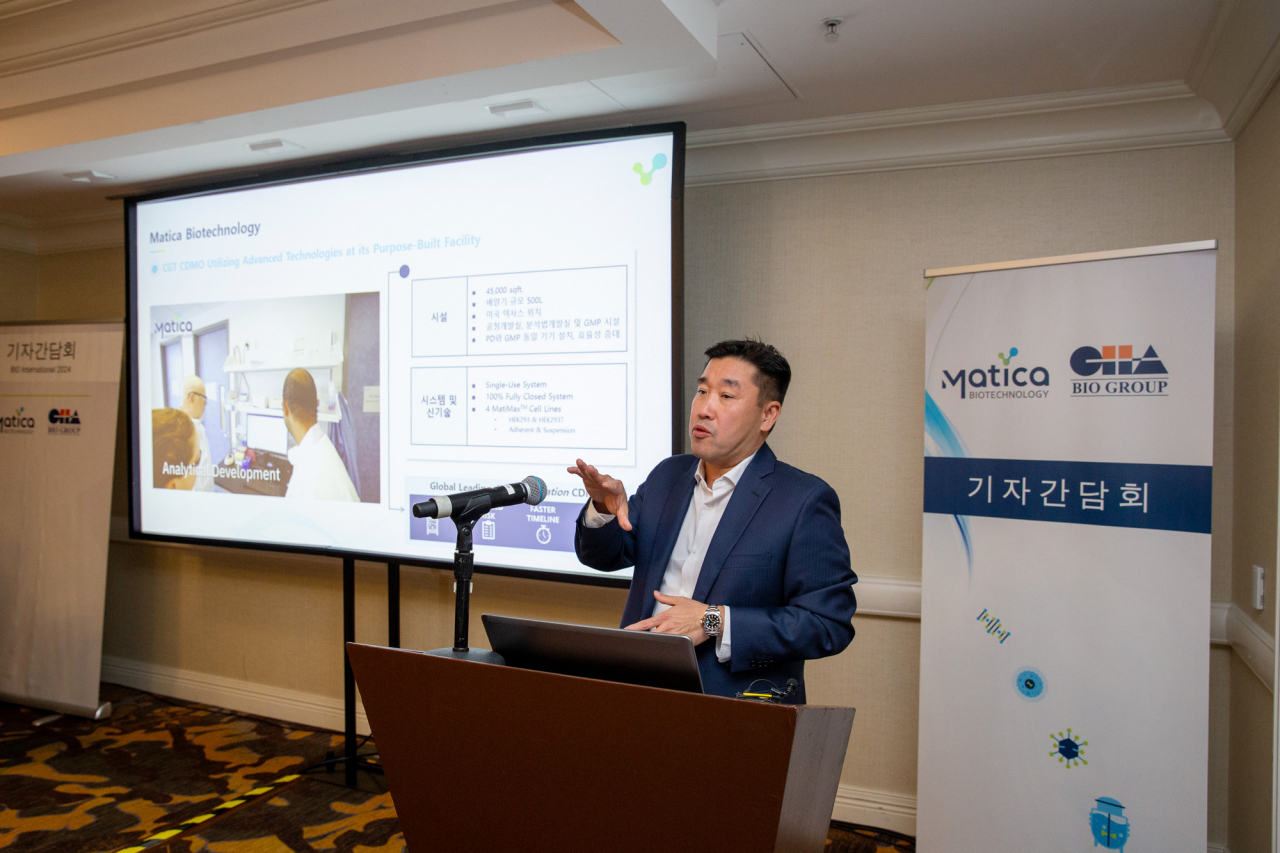Bio
[Bio USA] Cha Biotech's Matica Bio sets sights on CGT market growth
 |
Matica Biotechnology CEO Paul Kim speaks during a conference at Bio USA in San Diego on Tuesday. (Matica Bio) |
Matica Biotechnology, the US subsidiary of CHA Biotech, which operates CHA University's medical centers in South Korea and internationally, has announced endeavors for significant expansion of its cell and gene therapy (CGT) CDMO orders in particular, setting itself apart from most antibody production-based CDMOs in Korea.
At the firm's press conference during the Bio International Convention held in San Diego on Tuesday, Matica Bio CEO Paul Kim emphasized the anticipated growth in the CDMO market driven by the increasing demand and potential for CGT. He noted that this relatively new sector currently has no dominant companies with high market concentration up to now.
Meanwhile, the CEO also emphasized that Matica Bio's sales will also see a considerable increase following the US government's BioSecure Act, in hopes of replacing those with Chinese CDMOs.
"As a US entity, Matica Bio complies with the BioSecure Act. Our Texas-based plant is set to become a hub for CGT firms and experts alike, positioning us advantageously to secure more contracts in the future, as we offer comprehensive services from gene to clinic," Kim said.
While there are some 600 CGT developers in the US, Matica Bio is focusing on selecting and targeting developers that align with the firm's strategies and pipelines, according to the company.
Kim pointed out that, unlike standardized antibody drugs, CGT requires production in specialized ecosystems, making it difficult for big-name companies to enter without significant expertise.
"Antibody drugs are easier for conglomerates to mass-produce as they rely on capital investment for expanded capacity, but cell and gene therapies require specialized environments, catered to the needs of individual patients. In other words, the cells must be kept alive until the moment of delivery to the patient," he said.
"With CHA hospital's 40-year-old reputation as a women's hospital in the field of obstetrics and gynecology, we possess a deeper understanding of stem cells compared to other CDMO firms. We are confident in providing a one-stop CGT solution tailored to individual patients, from production to point of care," the CEO added.
In 2022, Matica Bio became the first Korean company to complete a CGT-customized CDMO facility in Texas. The company continued its progress by developing its proprietary MatiMax cell lines in 2023.
Matica Bio plans to expand its second plant in the US within the next three years, anticipating increased orders in the CGT sector. Once the second plant is operational, the firm's batch production capacity will rise from 500 liters to 2,000 liters.
According to the National Biotech Policy Research Center, the global CGT market is projected to reach some $41.7 billion by 2027.
The industry sees the demand for CDMOs is expected to rise as the number of CGTs receiving drug authorization increases. In 2023, the US FDA approved seven CGTs, with an additional three approved in the first quarter of 2024 alone.
By Kim Hae-yeon (hykim@heraldcorp.com)






![[From the Scene] Gigantic Olive Young store lures young trend-setters in Seongsu](http://res.heraldm.com/phpwas/restmb_idxmake.php?idx=151&simg=/content/image/2024/11/21/20241121050065_0.jpg)

